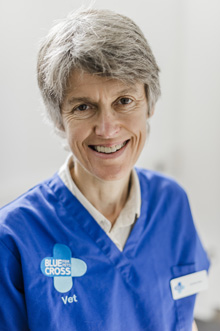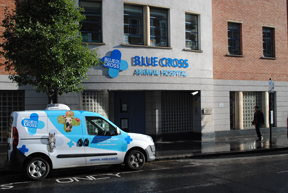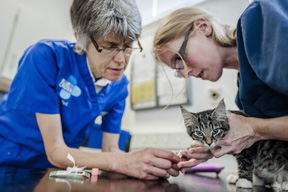From a city hit hard by the pandemic, a veterinarian tells of life, work and coping

Dr. Caroline Reay 220

Blue Cross photo
Dr. Caroline Reay is joint head of a charity in London that provides veterinary care to the pets of people on government benefits. While pandemic lockdown has given pets more time with their owners, Reay worries that animals that haven't received necessary treatments or vaccinations may become ill in coming days. She also anticipates a possible rise in unwanted kittens as a result of postponed neuter operations.
Dr. Caroline Reay is joint head of veterinary services at Blue Cross, a British charity that provides veterinary care to pets belonging to people on government benefits, as well as rehoming services, from dozens of sites across the United Kingdom. Reay, 57 and a University of Bristol graduate, has been in practice for 34 years and lives in London with her husband and cat.
By email, she answered questions about everyday life in a country that has recorded the highest number of COVID-19 deaths after the United States. The U.K. has logged more than 266,500 cases and more than 37,100 fatalities, according to a count kept by a Johns Hopkins University team, with London recording more than any other city there.
What is your neighborhood like?
I live in southeast London (so the "wrong" side of the river, as north London is perceived as being more desirable). Like many other parts of London, it's a mixed area in terms of affluence — there are some very poor people here but also some very rich — and in terms of ethnicity. There are people from all areas of the world, and the products in local shops reflect that diversity. But it's also a very green area, and there are several parks within walking distance of home.
How has day-to-day life in London changed during the COVID-19 crisis?
Everything is closed except for food shops, and there are queues outside, which can be long for supermarkets. Few restaurants or cafes are open — it's not easy to find a takeaway coffee these days! Initially, it was very quiet with little traffic, but that's increased as the lockdown has started to ease. We're allowed to take daily exercise, and there are more people in the parks than usual, especially when the weather is nice. We were lucky in that the start of lockdown coincided with a spell of good weather in the U.K.
How diligently are people complying with the U.K. government's lockdown measures?
Reasonably good, although not everybody is good at following social distancing. People walking past you in the street sometimes come too close. There are occasional groups gathered in parks. Initially, only a few people wore face masks (it's not compulsory here) but the number is growing.
Are you still working? If yes, how are you and your colleagues protecting yourselves?
Yes, we're still working — largely remotely by phone or video link — but we do also have people on-site offering in-person treatment for cases that can't wait. We no longer allow owners to enter our sites. They have to stay outside whilst our teams treat their pets and take histories or advise on treatment by phone.
It's particularly sad where a pet has to be euthanized, as the owner can no longer be there through the end. We've been able to get around this by sedating the pet and allowing the owner to sit outside in the car with them until the pet is asleep and can be removed for intravenous injection. But it's been difficult for teams to come to terms with this — especially as one effect of remote consulting is that the relative proportion of euthanasia has increased for those on hospital-based shifts, since less poorly pets are now more commonly being treated remotely.
Blue Cross ambulance 288

Blue Cross photo
An animal ambulance operated by Blue Cross is parked outside the charity's veterinary hospital in the Victoria area of central London.
Where they have to work within a 2-meter [6½ feet] distance of each other, teams wear appropriate PPE [personal protective equipment]. So far, we have remained reasonably well-stocked with basic surgical masks, although supplies are now limited.
Are you having to operate with a smaller crew? If so, roughly how much smaller, and how are you managing to take care of all the animals?
Yes. We've reduced to minimal staffing (often working longer shifts, so there are less people coming into the working environment). But the footfall of pets through our sites has fallen considerably, thanks to support from remote consulting, and there are few hospitalized inpatients.
In what other ways, if any, has your work at Blue Cross been affected by the crisis?
Change is always stressful. Although our teams have done a great job in coping, vets can find it stressful deciding whether a case can wait or needs to be seen right away.
A fair percentage of our clients fall into vulnerable categories and so are reluctant to travel, which can be a problem if we need to see their pet face-to-face. Although we usually provide our treatment for a donation from the owners, during this period, we've been encouraging owners to purchase [medicine] online or at other local pharmacies, and that's really reduced workload.
For urgent cases or owners who really can't afford treatment or who are isolating without any help, we have a team delivering medicines to their homes, but that's becoming more difficult, as traffic is growing and our income has fallen.
Have you seen a rise in animal rehoming requests? If so, why might that be the case?
We have, but as yet don't fully understand the reasons behind it. It might be financial — although government support is available for many workers, there are a few groups not covered. It's also possible that people are struggling with the demands (physical, mental and financial) of care for animals with long-term health problems, or that more time spent at home has meant that owners feel unable to cope with animals with behavioral issues.
In what other ways, good or bad, are domestic animals affected by the pandemic?
Reay and Hodges 288

Blue Cross photo
Dr. Caroline Reay and Deputy Veterinary Nurse Manager Debbie Hodges draw blood from a 12-week-old kitten, Tinkerbell, at the Blue Cross animal hospital in Merton, south London.
It's great that they have more contact time with their owners, and that dogs are getting walked more between multiple family members. But we worry about puppies acquired during this period. In some ways, lockdown seems a good time to get a new pet, but some aren't getting proper socialization or vaccinations — although more vets in the U.K. are now providing vaccinations, and we plan to do so soon. We also worry about separation anxiety when we all go back to work. New advice for puppies in socialization and a vlog series can be found here.
Have any particular incidents at Blue Cross inspired you during this difficult time?
The gratitude of clients for a remote consult with quite a few actively expressing a desire to make a financial contribution. Also, our teams have found innovative ways to make things happen (e.g., delivery of prescribed medication) that would have seemed impossible weeks ago. They have pulled together to make it work, but we're becoming more concerned that the effects of the long-term stress will begin to show.
Do you know anyone who has or had COVID-19 or an illness resembling it?
Yes, a couple of our team members have family members who have been hospitalized with it and one person sadly lost their father, although thankfully, so far, the rest have recovered. We've also had a couple of people who have been sick with symptoms, but haven't been tested. Widespread testing has only just become available in the U.K.
How has the emergency affected your personal and family life?
I'm very lucky in that we live in a house with a garden, and my husband works from home anyway, so the change has been minimal for us, although we have had to cancel a couple of weekends away.
The biggest impact is not being able to visit my elderly mother-in-law. She's very healthy but frustrated by the need to isolate, and, of course, we miss seeing her. I feel really sorry for those with families living in flats, especially as some green spaces in London have been closed during spells of good weather because of fears of overcrowding.
What are your biggest concerns in the coming weeks and months?
A second wave of infections and mortalities. We're also concerned about animals that may not have received necessary treatments during this period and that lapsing vaccinations could bring a disease epidemic. And we may see a rise in unwanted kittens, as cats are not being neutered.
Do you see any silver linings from this crisis?
I think it's speeded the adoption of remote consulting, which can be very good for animals and owners (a lot less stressful) and gives vets the option of flexible homeworking. In general, it's made everyone more familiar with using technology. I've actually chatted more virtually with friends and colleagues in the last few weeks than I do usually, sometimes exchanging videos so I get to see little slices of their lives that I wouldn't normally. Perhaps because I feel more socially isolated, I'm keen to turn up to team catch-up meetings.